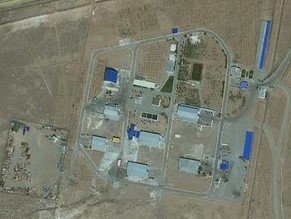|
World Jewish News

A military base is seen near the town of Bid Kaneh, in Iran, in this satellite image taken on September 9, 2011, and released by the Institute for Science and International Security (ISIS) to Reuters on December 2, 2011. MANDATORY CREDIT - GEOEYE REUTER
|
IAEA to seek access to Iran's nuclear sites in new talks
21.08.2012, Israel and the World The UN nuclear watchdog will attempt in new talks with Iran on Friday to make progress towards answering questions about suspected atom bomb research in the Islamic state, more than two months after the previous meeting ended in failure.
The International Atomic Energy Agency (IAEA) issued a brief statement confirming the talks, to be held at Iran's diplomatic mission in Vienna, after diplomats earlier on Tuesday told Reuters they expected a new meeting on that day.
The meeting, to be attended by senior IAEA officials, will take place just a few days before the UN agency is due to issue its latest quarterly report on Iran's disputed nuclear program.
It could give Iran a last-minute chance to influence the content of the report if it were to offer concessions to UN inspectors seeking access to sites, officials and documents they say they need for their inquiry.
But Western diplomats said they did not expect any breakthrough.
Tehran denies Western allegations it is seeking to develop a capability to make nuclear bombs. But its refusal to curb and be more transparent about its nuclear activity has led to increasingly tough sanctions and sparked speculation that Israel might attack Iranian nuclear sites.
Iran "will try something", one of the diplomats said. But, "I don't see any bridging of the differences on the issues that were outstanding" in the last meeting on June 8.
The IAEA said its delegation would be led by chief inspector Herman Nackaerts and Rafael Grossi, assistant director general for policy.
The two sides would hold "further discussions on a structured approach to resolve outstanding issues relating to Iran's nuclear program," it said, referring to suspicions of possible military dimensions to Iran's atomic activity.
The IAEA report - which is expected to show Tehran pressing ahead with its uranium enrichment programme - will be submitted to the agency's 35-nation governing board, which meets on Sept. 10-14 with Iran likely to again dominate the agenda.
West suspects Parchin clean-up
The IAEA has failed in a series of high-profile rounds of talks since January to persuade Iranian officials to stop stonewalling the agency's inquiry into indications that it has engaged in illicit nuclear weapons research.
The UN watchdog has been pressing Tehran for an agreement that would give it immediate access to the Parchin military complex, where it believes explosives tests relevant for the development of nuclear arms have taken place.
Western diplomats suspect Iran has been purging the site of any incriminating evidence, a charge Tehran has dismissed.
Iran says there must first be a wider accord with the IAEA on how the agency's investigation should be conducted before possibly allowing inspectors into Parchin.
Analysts say Iran seems to be using its discussions with the IAEA to gain leverage in its separate meetings with six world powers that have made little headway since they resumed in April after a 15-month gap.
The six powers - the United States, France, Russia, Germany, Britain and China - also want Iran's full cooperation with the UN watchdog. But their more immediate demand is that Iran stop activity that could give it the capability to build atom bombs.
Iran seeks recognition of what it says is its legal right to enrich uranium - which can yield either fuel for nuclear power stations or for bombs - and a lifting of harsh economic sanctions now targeting its economically vital oil exports
JPost.com
|
|
